Waste Management at Its Best: The Story of Doko Recyclers SOCIAL ENTREPRENEURSHIP BLOG SERIES NO 20
Far from the maddening crowd, there is a wide stretch of land in Sano Thimi, Bhaktapur, filled with recyclable waste collected from over 2000 different households and hundreds of institutions. Even though it is teeming with what we generally call waste, there is no foul smell. We are inside Doko Recyclers's Materials Recovery Facility where we see bottles, papers, plastics, wires, electronic waste, and other items being segregated. While we wait to interview one of the co-founders and CEO Kushal Harjani, Bijay, one of the staff members, gives us a tour of the facilities where dry recyclables (paper, plastic, metal, glass, and e-waste) are processed. We then meet Kushal, who leads us towards a stack of used glass bottles and starts telling us about the journey of Doko Recyclers.
How did Doko Recyclers start?
Doko Recyclers started when me (Kushal Harjani) and two of my friends (Raghavendra Mahto and Runit Saria) decided to found a social business that would combine profit with purpose. Having studied and studied abroad, we were accustomed to recycling, segregating waste at source, and conserving resources in general. Having talked to Nepalis who have been abroad, they too realize that our lack of recycling and segregating waste at source is quite problematic not just for the environment but for human health as well. Knowing that people would support our cause, we were eager to take on this opportunity.We realized there was already a traditional recycling business in Nepal, running via a strong network of informal scrap dealers - ‘kawadiwalas’. They are the real heroes of recycling in Nepal. In fact, if they weren’t there, our landfills would be in worse conditions than they are now. This showed us there was already a market for some recyclable materials. We wanted to expand on the types and amount of dry waste we could recycle so we could capitalize on resources that were otherwise ending up in the landfill.
We also wanted to not only introduce recycling in Nepal, but standardize it to such a point that it is in our legislation and reflected in our behavior. Working in waste is considered a lowly occupation which has led to waste management being neglected. We wanted to teach people that waste management is a field filled with opportunities for growth and development not just for individuals but for the economy as well. At the end of the day, there is, of course, we desire to see Kathmandu lush green again with a pristine Bagmati gushing through it.
What is the vision of your company?
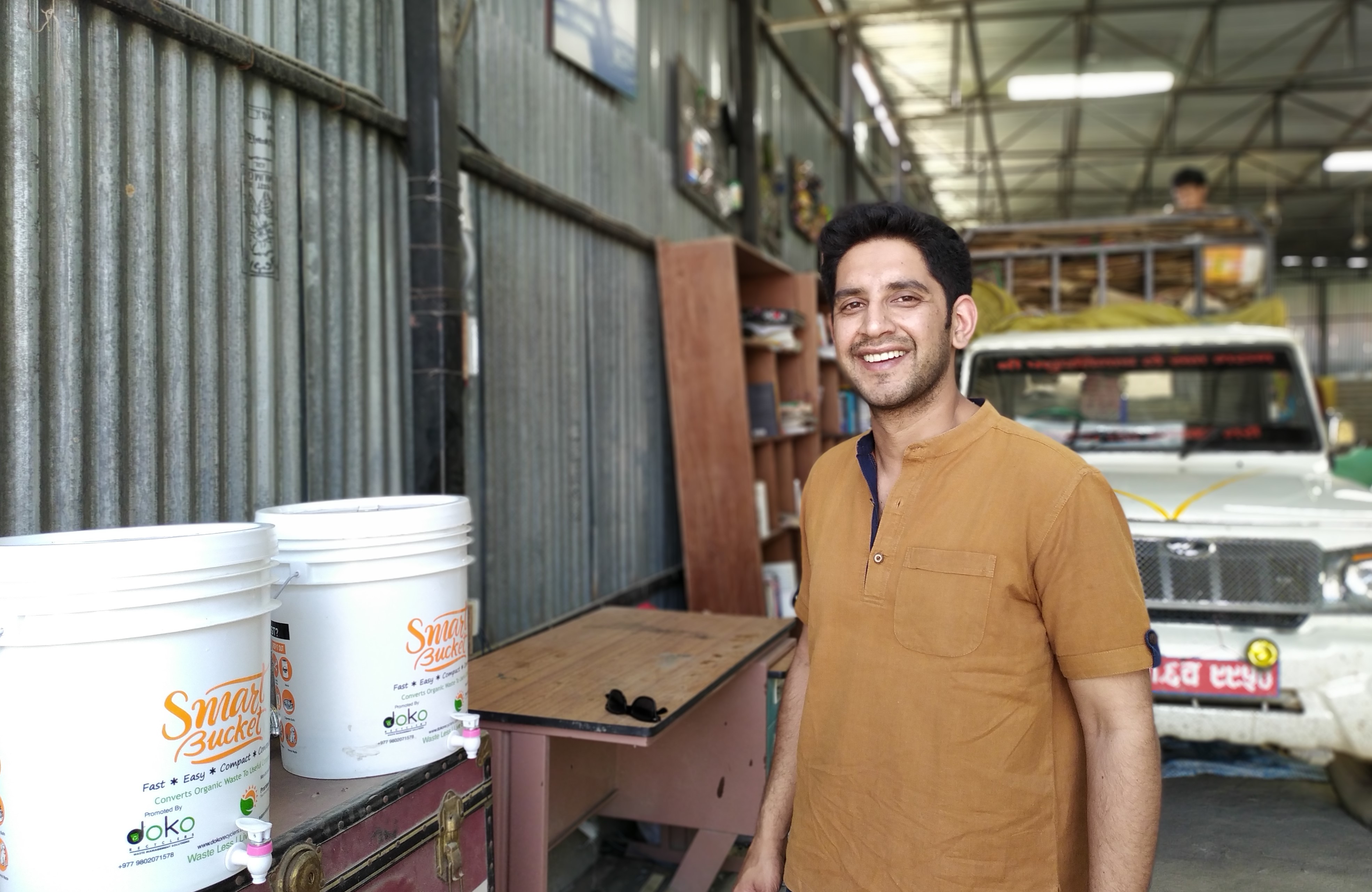
Our vision is to standardize proper waste management and implement it across the country such that 90% of the waste we generate would be recycled instead of ending up in landfills. This would not only ensure our environment (mainly water, air, and soil quality) would be better, but it would also circle back valuable resources into our economy. We would love to make Nepal’s economy a circular one instead of the linear one it is currently. Recycling resources back into the economy, of course, can only happen after segregation of waste. It is also our vision to make the entirety of Nepal understand the importance of recycling and practice segregation of waste at source.
Additionally, almost 60% of our waste is organic and yet at the same time most of it is landing up in our landfills. For this, we have launched our Smart Buckets for home composting. Furthermore, approximately 30% of waste generated is recyclable so if people segregate their organic, their recyclables, and their landfill waste, not only would recyclables be circulated back into the economy, we would also be able to solve the current waste crisis.
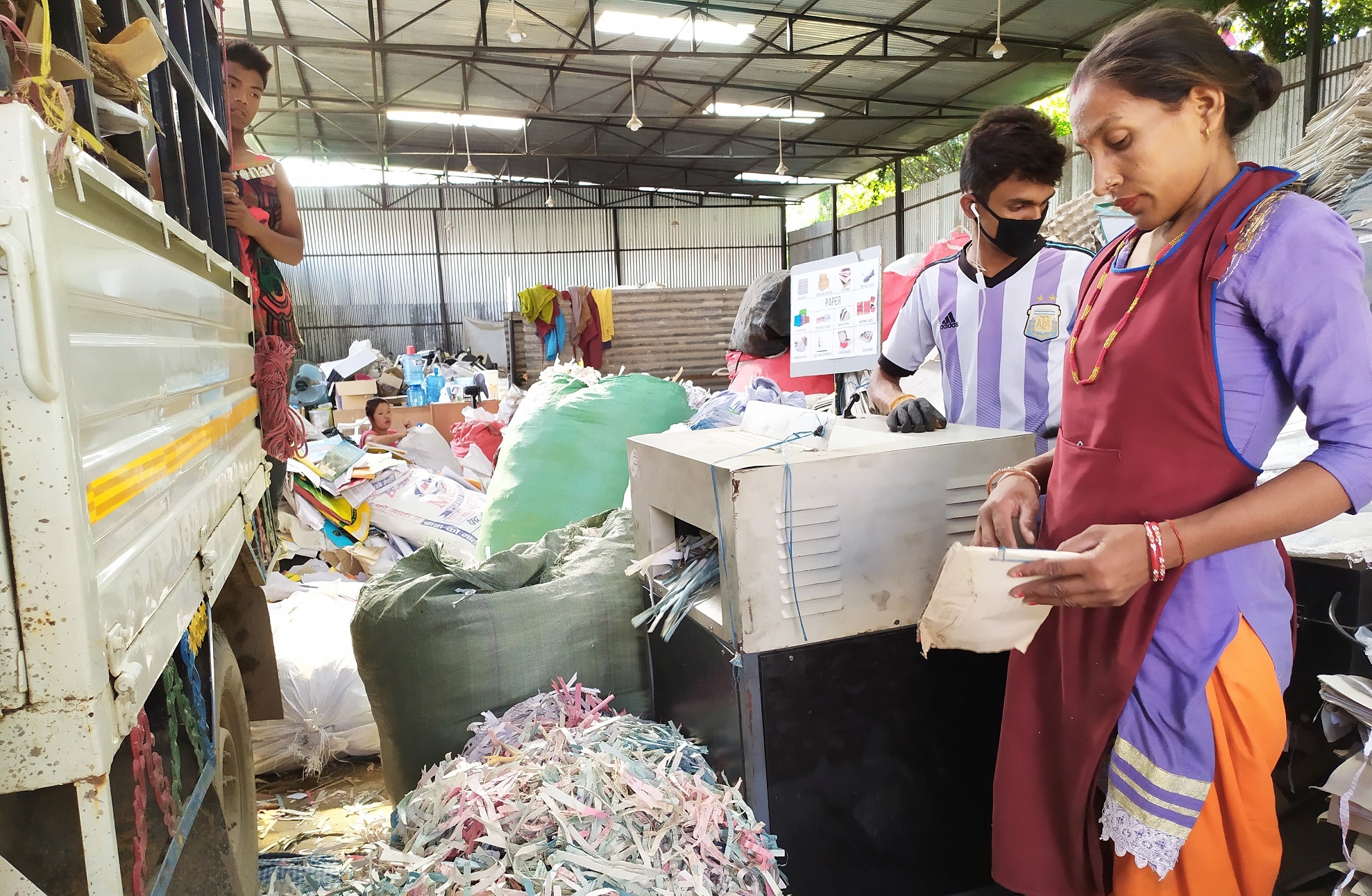
How has the journey been till now? What were the initial challenges?
None of the core team members are from a waste management or environment studies background. I have my masters in Development Economics, Raghavendra is an MBA graduate, and Runit is a Computer Engineer. Ashma Basnyat and Pankaj Panjiyar who joined us later are also an Urban Planner and Electrical Engineer respectively. While we bring unique and diverse approaches to our company, since there were no properly established systems or models about recycling that we could follow, it was difficult for us to learn about waste management in Nepal. Hence, the journey of forming Doko Recyclers was about educating ourselves on waste management and interacting with numerous stakeholders including government experts, private companies and the informal sector.
The challenge for us was that we needed to figure out a way to expand Nepal’s understanding of recycling beyond the basic paper, beer and Coca-Cola bottles, and scrap metal parts. If most people are used to selling dry waste, why not expand the scope to include other important recyclables like plastics, e-waste and encourage separating organic waste? We aim to bring behavior change in our
society that will benefit everyone in the value chain and we aim to support this behavior change by being the vessel through which you can recycle efficiently and responsibly.
Another challenge we face is the fact that the government has taken very little initiative to implement policies for scientific waste management. There is currently no standard policy in practice for the management of several types of hazardous waste such as industrial, medical and electronic waste. The government itself does not act as a model for others by continuing to improperly manage waste generated at government offices, including the burning of confidential waste rather than shredding. Furthermore, the waste sector in Kathmandu is currently not based on an open market system - traditional syndicates have meant that there has been little improvement in the quality of service, hygiene standards and end disposal methods of waste. The existing recycling industry in Nepal is limited in scope and therefore we often find it difficult to deal with several low value recyclables that otherwise get dumped or landfilled.
Lastly, as a startup, we have been through some tough days in our early stages, especially with building a strong team and continuing to balance our finances. We are now in a much more stable position as a company and are excited to grow to the next stage.
How do you operate?
Before finalizing any organizational client, we conduct a waste audit that provides us with information on recycling and possibilities of segregation at the client’s premises. After the audit, we make sure necessary infrastructures like different compartment bins are set up to facilitate segregation of waste for the client.After the bins are set up, we conduct awareness workshops (targeted primarily for cleaning staff) that educate people on how to recycle and segregate waste properly. We then provide regular pick up of dry recyclables for our clients. We charge a monthly membership fee for that, but in return, we also pay our clients for the dry recyclables they collect. The charge is quite nominal. It ranges between 800 to 3000 depending on the size and type of client. We are currently providing services inside the Kathmandu valley but are planning to go to other cities outside the valley as well.
As you said that people are not habituated in recycling. How has been their feedback?
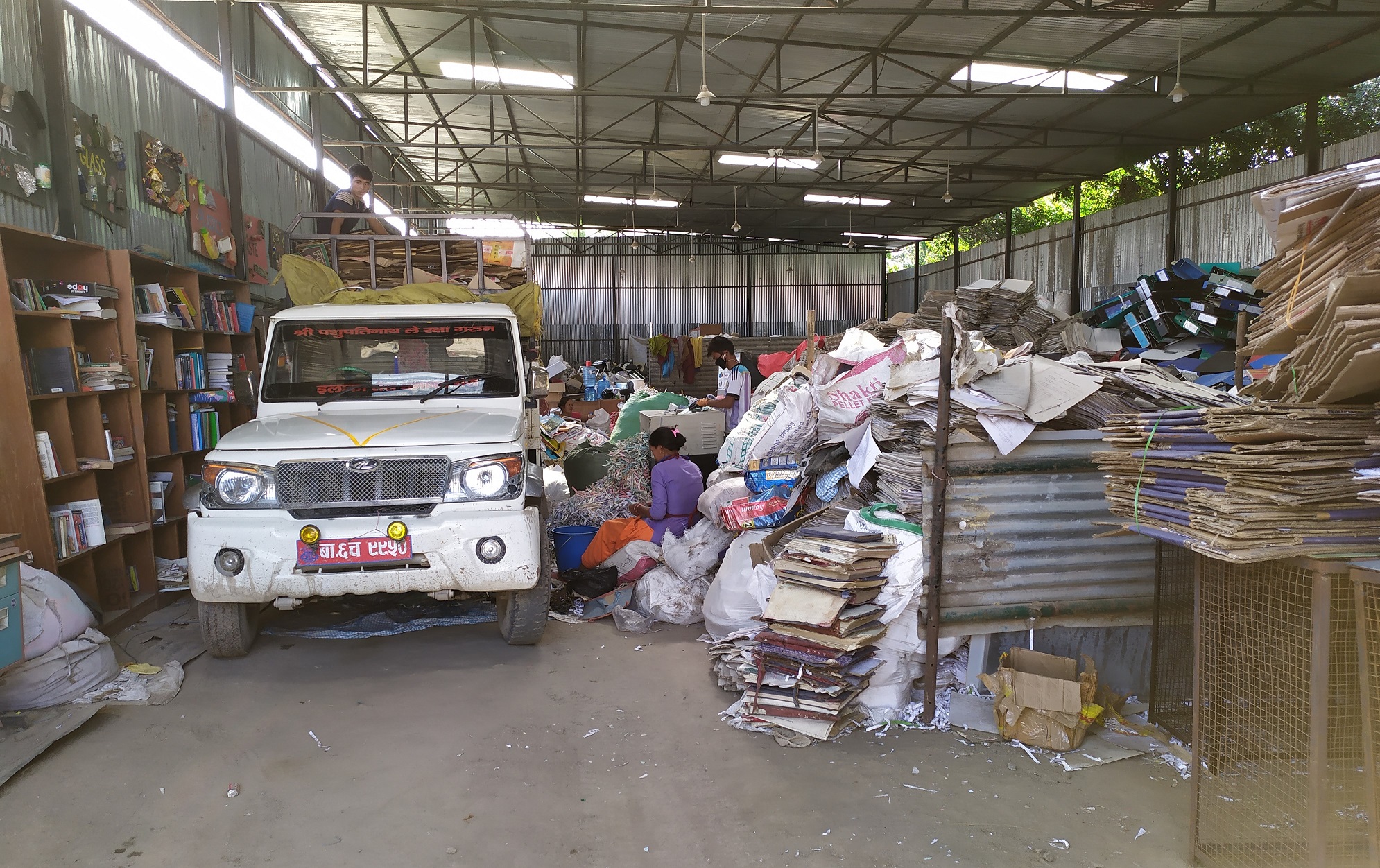
We have gotten an overwhelmingly positive and supportive response from all walks of society who are looking for a solution to the waste crisis. Yes, we are not used to recycling so raising awareness has been challenging in terms of encouraging people to segregate waste at source. This is why we conduct educational tours of our Materials Recovery Facility where we educate students on our waste collection and segregation process. We teach them about recycling, and play recycling games with them to increase their knowledge about waste so as to make them understand how important it is to reduce, reuse, rot and recycle. We have also partnered with several events to help them minimize their landfill waste and to spread the message.
We also provide an impact certificate to our clients. Based on the weight of the collected waste and recyclables, we calculate impact statistics for individual clients that shows converted data like energy, trees, landfill space, water, and oil being conserved by the recycling they have been doing with us. This incentivizes our client’s behavioral change and they are happy to know that their effort is actually creating a tangible impact on the environment.
We are constantly providing feedback to our clients and follow up with them if they fail to segregate their waste at source. It is difficult at times to make people understand that segregating waste or recycling should no longer be optional and it should come as second nature to us. We are slowly seeing these changes but like with new idea introduced to the populace, it will take time and effort which we are well aware of and work hard to change people’s mentalities towards waste.
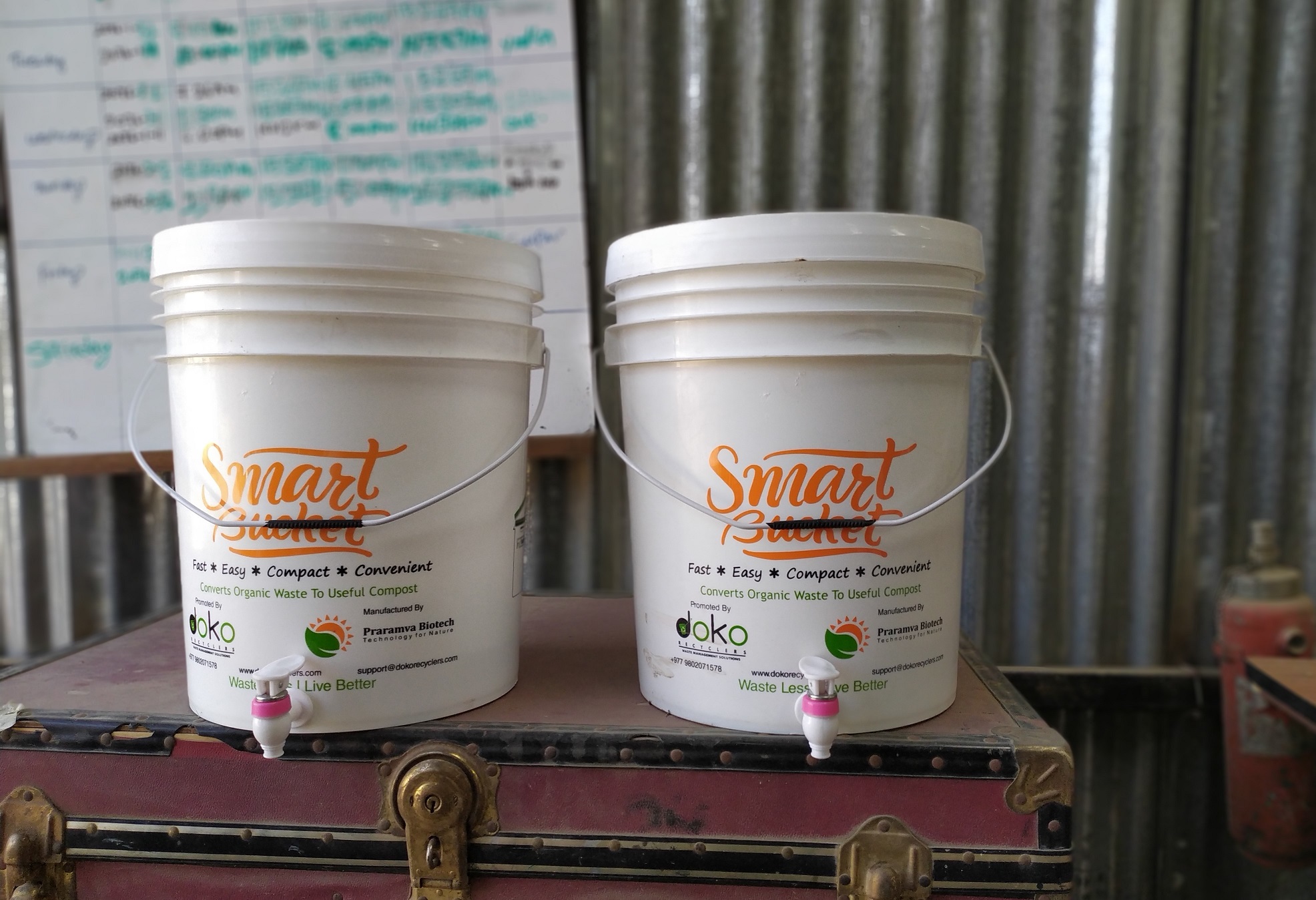
How do you count on your achievements so far? How you are creating social impact?
As part of our achievements, I would say the first and foremost achievement is the social impact that we have had. We are raising awareness about a long standing issue that many people bemoan about but few actually act on. We have stirred a conversation about waste and are steadily setting industry standards for professional and scientific waste management that has resource and environmental conservation at its core. We are also working with the government to encourage better implementation of existing policies. We have now over 100 institutional clients including INGOs, hotels, travel agencies, and various schools recycling with us. Our involvement and collaborations are still growing and we are happy to continue teaching the general public how to recycle and segregate at source.. Our efforts have tangible results as well. Our clients are reciprocative to the idea of recycling and we have people reaching out to us to help pick their recyclables up on a daily basis. Last year alone, we recycled more than 250 tons of waste, which translates into around 1900 trees and a million liters of water.
How are you managing the different types of waste that you collect?
We believe that waste is simply a material that has lost its utility in its present form, but that does not mean it does not have utility in some other form. Our mission is to make people recognize the utility that still exists in recyclable waste and it is paramount that we do not throw away resources. After collecting recyclable waste, we then segregate into different categories and make it ready to use for different recycling industries across Nepal.
There are many organizations that accumulate a huge bundle of confidential papers and documents. Keeping them in mind, we have recently launched professional data destruction and paper shredding services to encourage people to shred and recycle rather than burn these papers. Similarly, we are the first professional company managing electronic and electrical waste. If electronic and electrical waste is not properly disposed of, the elements in the circuitry leach in the soil poisoning groundwater and posing a risk to human health. We continuously invest in developing technology that will help us scientifically manage waste. For example, we have recently procured a wire stripping machine that separates metal and plastic from the wire. Without these solutions, we would be burning documents and wires releasing toxic fumes into the atmosphere.
If there are any wastes which cannot get recycled, how do you deal with them?
Our vision is to be able to utilize all the resources that we collect and find creative solutions for waste that is currently dumped. Let me give you an example - there is no glass recycling industry in Nepal. Most bottles that are currently collected are reused and rebottled, which means only a fraction of domestic bottles get reused and collected in the current recycling industry. We, on the other hand, have collected these bottles and are now moving towards converting them into decorative items through our recently launched upcycling brand - 'Tatwa'. Upcycling is creatively repurposing an item which would otherwise end up in the landfill.
Are there any suggestions you want to pass to the aspiring social entrepreneurs?
Where there are problems, there are opportunities. As an entrepreneurship, ones entire effort should be directed towards realizing a problem and brainstorming solutions for them.One should be level headed and humble enough to self teach and learn about the field they want to work in. It is critical to extensively research the sector that you
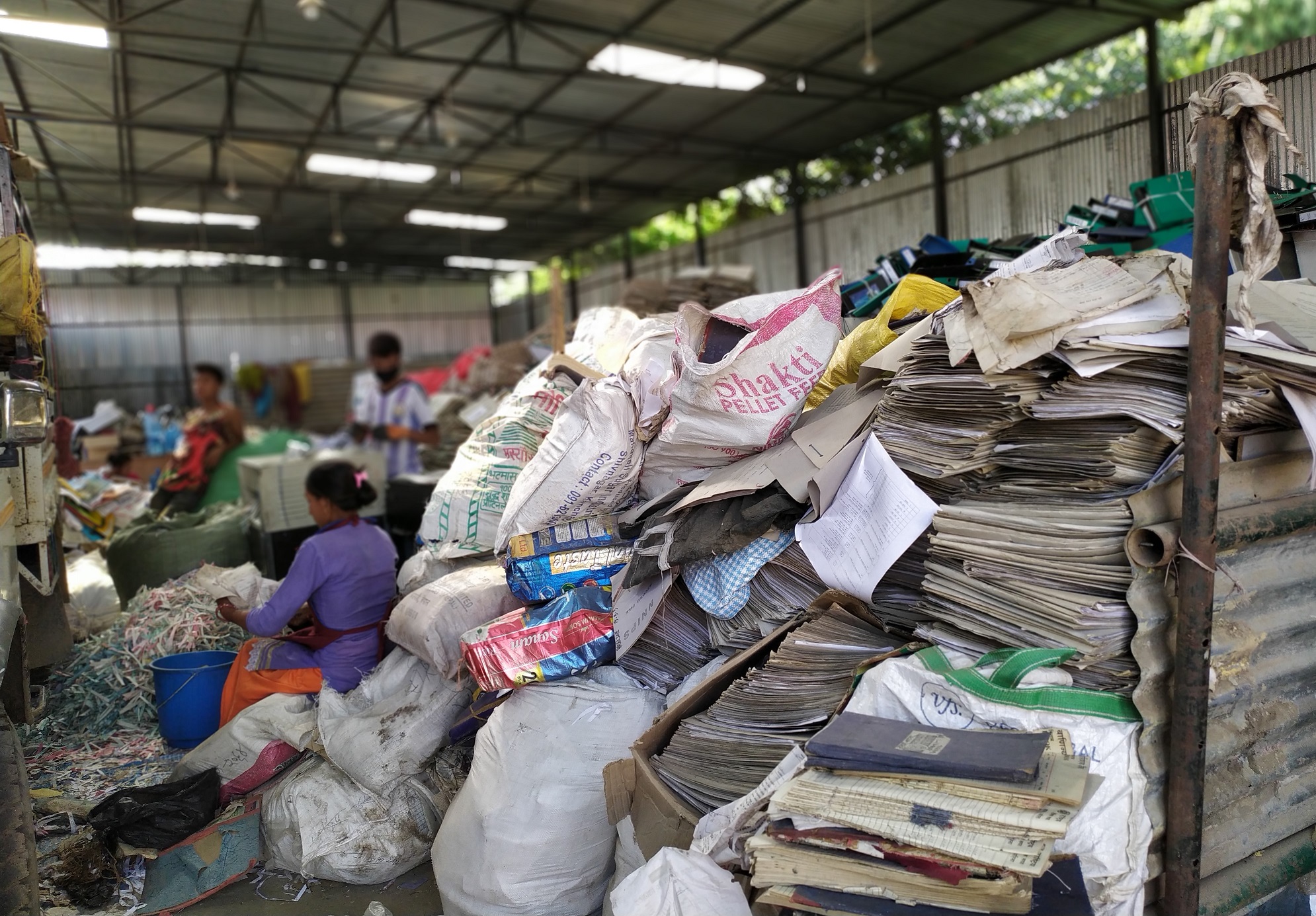
want to work in. It is necessary to be clear about your passion, vision, and to reach out for various types of resources and funding opportunities. It is also important to be well versed in the financial and legal requirements of running a company.
The last advice I would give is to take a guerilla approach. Apply the MVP (Minimal Viable Product) technique. When you are trying new things, you cannot afford investing a huge amount just to realize that the model is not correct. There are many challenges that startups in Nepal face, which is why it is necessary to fail fast, learn fast and then move ahead. When the going gets tough, always remember the tough gets going.
Find out more about Doko Recyclers: https://dokorecyclers.com/
